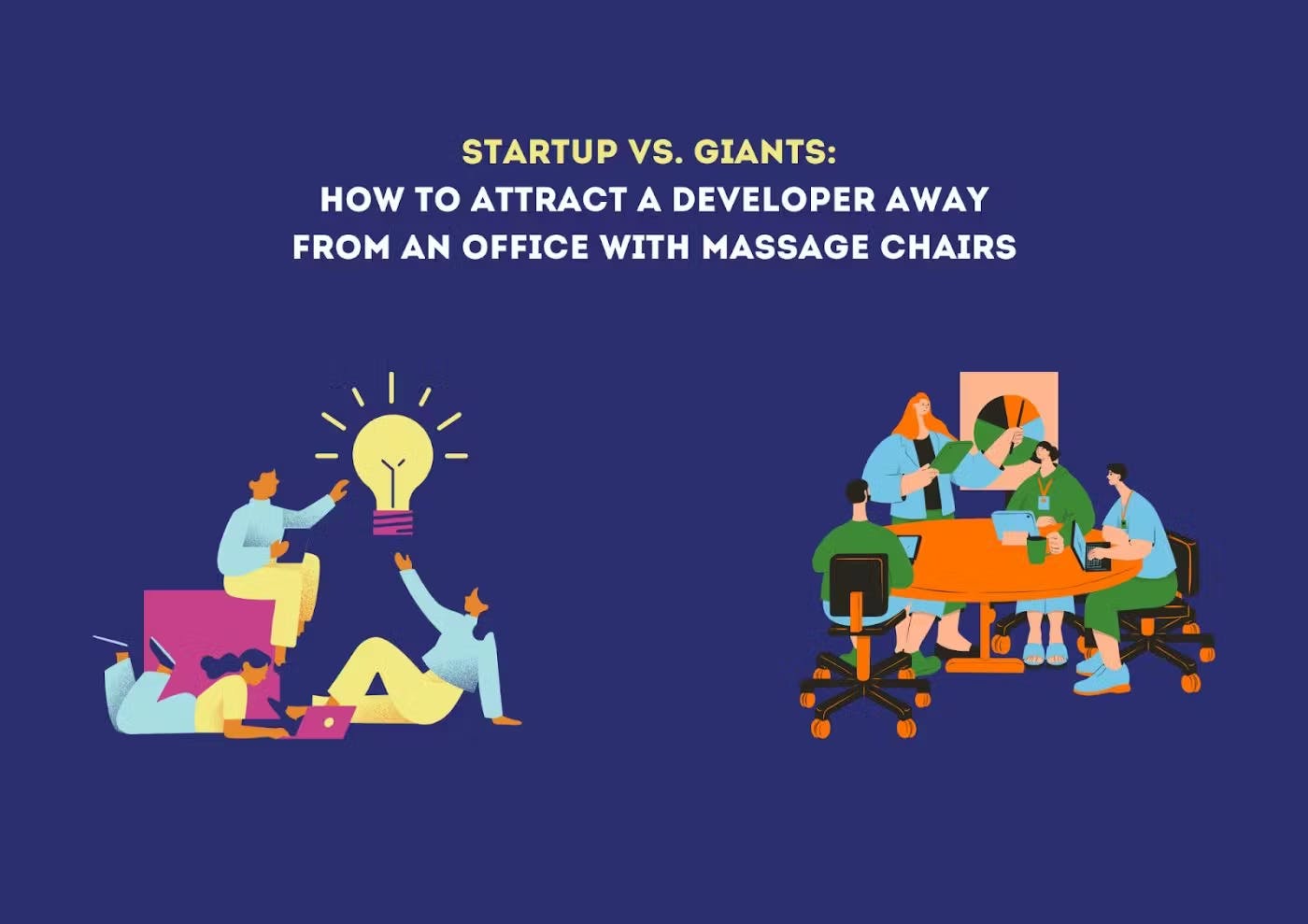When a startup decides to hire a programmer, it’s a bit like trying to win the heart of a Hollywood star. Competing in the game are large corporations with bottomless wallets, well-known brands, and free cappuccinos at every corner. And you? You have burning enthusiasm and a billion-dollar idea (in theory).
But don’t rush to feel discouraged. Programmers aren’t robots who always choose the company with the fattest wallet. Many of them want more than just a job — they want to feel like an essential part of something meaningful, to see the results of their efforts, and, yes, sometimes sleep in until noon without fearing the stern gaze of HR.
I interviewed 20 developers of different genders, ages, temperaments, and qualifications, working in various countries and speaking other languages, to understand how small companies can not only survive the competition with giants but actually win. This article is about how to find that one programmer who isn’t afraid of a “raw” product, can shoulder some of the startup chaos and become your key ally on the path to success. Spoiler: it will take more than just money. You’ll need creativity, sincerity, and a bit of cleverness.
The pros of working in a startup
Working at a startup is like signing up for a round-the-world journey on a small boat. Sure, some might prefer a cruise ship with pools and buffet dining (hello, large corporations), but true adventurers go where they can take the helm, choose the route, and occasionally bail out water.
Many studies show that if the salary is fair and competitive, many people are willing to trade a higher paycheck for freedom, growth, and the chance to create something meaningful.
So, why might programmers choose to work at a startup?
1. Flexibility in everything
The work schedule in a startup might resemble a restaurant menu: “What works best for you?” Not productive in the morning? Work at night. Visiting your grandma in the countryside? No problem, as long as you have a stable internet connection. Small companies understand that happy employees work better and won’t stand in the way of their happiness.
In a 2021
2. Freedom and autonomy
In startups, no one will tell you that code must be committed at 10:00 AM according to regulations. Here, the focus is on results, not the process. Want to work at night, wrapped in a blanket with a cat on your lap? Go for it.
3. Impact on the product
Programmers in startups are like chefs in their own kitchens. You’re not just writing another module for a CRM system; you’re creating something that could potentially change the world — or at least attract the first ten users.
4. Variety of tasks
You won’t spend years polishing the same “Pay Now” button here. Today, you’re coding the backend; tomorrow, you’re setting up CI/CD; and the day after, you’re suddenly in charge of configuring the corporate email. And that’s not a joke.
5. Potential growth
The journey from junior to senior in a big company can take decades. It’s a different story in a startup: you join as a junior, and if the startup survives, you might be the CTO in just a few years. Fast development is guaranteed.
6. No bureaucracy
Forget about weeks-long approval processes where a committee of 15 people debates your request to add a button. In startups, decisions are made quickly — sometimes too quickly, but that’s where the excitement lies.
7. Lively atmosphere
Startups don’t have cold, open spaces for 500 people where HR only knows you by your employee ID number. Here, you’re not just an employee; you’re a friend, a partner, and maybe even the co-author of jokes in the team chat.
8. Quick decisions.
You propose an idea — it’s discussed immediately, without endless meetings or bureaucracy. Yesterday, you came up with a feature, and tomorrow it’s almost in production (well, nearly). Admittedly, sometimes decisions are made so quickly that only in production do you realize the idea was… a bit odd.
9. The ability to influence
Your voice matters. Here, you’re not just executing someone else’s ideas; you’re a creator. Want to implement a new technology? Say it. You’ll hear “yes” as long as it doesn’t require selling a chair from the office. In a big company, you might not get that chance.
10. Less politics, more work
In large corporations, every project feels like a battlefield for budgets, resources, and managerial attention. In small companies, it’s simpler: no extra layers of management, no convoluted processes, and no corporate drama. When the team consists of just five people, there’s no one to stir things up — and not in a good way.
11. A unique experience
Working at a small company isn’t just about “writing code and getting paid.” It’s a story you’ll share with friends — how you launched a project from scratch, solved problems on the fly, and came up with creative solutions. And if the startup succeeds, you’ll take pride in knowing you were there from the very beginning.
12. Choice of technology
In small teams, programmers often have more autonomy in choosing technologies, tools, and approaches. This fosters a sense of responsibility and satisfaction with the work accomplished.
Creating an attractive offer
Remember, developers are not just code-writing machines but people with dreams and ambitions. Instead of a dry list of your company’s perks, craft a proposal that tells a story. Focus on the advantages of startups we discussed earlier to strengthen your narrative. It should feel like a letter to an old friend — genuine, a little bold, and compelling enough to elicit a response.
Share your mission and values! Don’t be afraid to show the soul of your project. Emphasize that joining a startup is a chance to be more than just a cog in the machine, but a true co-creator of success. While you might not be able to offer salaries 80% above market rates, compensation should be fair. Offer a stake in future triumphs — something HR teams in large corporations don’t usually provide.
Make it clear that originality is valued: “Your crazy ideas are not only welcome but might just become part of our ambitious plans.” A touch of humor, a bit of warmth, and voilà — your offer becomes a magnet for those seeking not just a job but a real adventure.
Help developers feel their importance — that’s a powerful motivator. Show them they won’t just be a small part of the system but a key player.
An interview with a programmer isn’t just an interrogation. It’s like a blind date. Remember, both sides hope it works out. During the interview, share the project’s mission and challenges in detail and with sincerity, and don’t forget to ask what matters most to the candidate.
Keeping the talent
Hiring a programmer is only half the battle. Retaining them, especially when big corporations start dangling free lunches and annual bonuses in front of them, is the real challenge.
You must be prepared to dedicate significant time to communicating with your developers, particularly if you have just one, two, or three on your team. The fewer programmers in your company, the more critical it is to engage with them regularly (or even with just one person).
You need to ask, “How can I help you?” and “What’s holding you back? — and then genuinely assist them. If they request something, make a real effort to fulfill it. There’s a great quote from Richard Branson floating around LinkedIn that says the only way to ensure long-term team loyalty and success is to treat your employees like family.
For a startup, a programmer isn’t just an employee — they’re your partner on the path to success. Show respect, invest your time and attention, be accommodating, offer help, motivate them, and give them freedom. Do this, and they’ll stay with you — even when a neighboring corporation waves bonuses in their face. The key is making them feel valued and understood.
What do people say?
I asked four developers I personally managed to hire for a small company why they decided to join us, and here’s what they said:
A Middle-level developer (by experience, but a confident Senior in terms of skills), who was recruited from a company serving major banks:
“For me, creative and personal freedom is essential. Plus, everything in banking moves at a snail’s pace, using outdated technologies. I wanted new and useful knowledge and to make decisions on the fly, not a year before the release.”
A Senior developer with experience in teams of 200+ developers:
“I got very tired of the bureaucracy and, dare I say it, ‘office politics.’ I wanted to test new ideas as soon as they came up.”
A Junior developer:
“After a year working in a team of about 100 developers, I craved variety. The work had turned into routine maintenance of a single feature. It felt like I wasn’t growing professionally — and then I found you.”
An entry-level specialist, candid and honest:
“I just needed experience. Big companies with good salaries wouldn’t hire me anyway. 😂”
To sum up
So, you’ve decided to compete for developers. Maybe you started this journey feeling like it’s impossible to go up against corporations. They’ve got millions for salaries, office gyms, and free almond milk lattes. And you? You’ve got a startup, an idea, enthusiasm, and maybe a coffee machine that works half the time. But you know what? That’s enough.
While gathering material for this article, I interviewed 20 developers of different genders, ages, temperaments, and qualifications, working in various countries and speaking other languages. Only one said, “I’d never join a startup; only corporations for me.”
Your mission is not just to hire a programmer. Your goal is to find someone who will share both the joys and the challenges of your startup — someone who can write code and then fix the server that code broke. Most importantly, someone who won’t leave for a competitor chasing a Spotify subscription as a bonus.
Remember, success in hiring a programmer isn’t about money. It’s about sincerity, atmosphere, and a sense of significance. Big corporations can offer standard perks, but only small companies can deliver true excitement and the feeling of being part of something great.
So don’t give up. Be honest, a little cunning, and always maintain a sense of humor. In a world where developers are drawn more to great code than to flashy corporate parties, your sincerity and creativity might just be the key to success.



/cdn.vox-cdn.com/uploads/chorus_asset/file/25822235/IMG_1601.jpeg)






